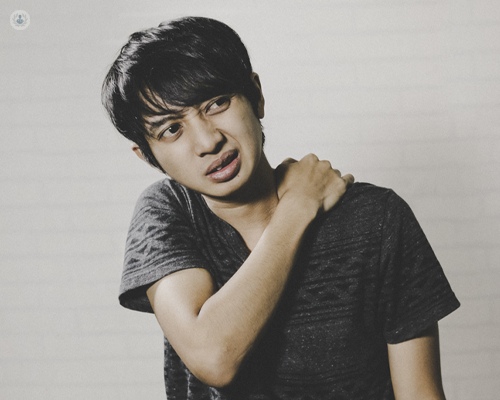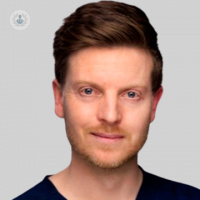Recovering from rotator cuff surgery: What's involved?
Written in association with:Recovering from rotator cuff surgery is a gradual process that requires a combination of rest, rehabilitation, and patience. The rotator cuff, which consists of muscles and tendons that help stabilise and move the shoulder joint, can become damaged or torn due to injury or wear and tear over time.
Surgery is often recommended when the injury is severe or when conservative treatments like physical therapy and medication have not provided relief. In this article, leading consultant upper limb and hand surgeon Mr Alexander Magnussen tells us what to expect during the recovery process.

Post-surgery immobilisation
Immediately after surgery, the shoulder is typically immobilised in a sling to protect the repair and allow initial healing. This period can last several weeks, depending on the extent of the surgery. During this time, it is important to follow the surgeon’s instructions regarding movement restrictions, avoiding any strain on the shoulder to prevent re-injury.
Pain management
In the early stages of recovery, pain and discomfort are common. Pain relief is often managed with medications, ice therapy and proper positioning of the arm. Your surgeon may recommend a combination of prescription painkillers and over-the-counter anti-inflammatory medications to help manage discomfort. It’s important to take these as directed and communicate with your healthcare provider if the pain becomes unmanageable.
Physical therapy
Rehabilitation through physical therapy is a crucial aspect of recovery from rotator cuff surgery. The process is divided into phases, beginning with gentle passive exercises and progressing to active movement and strengthening exercises as the shoulder heals. The aim is to restore range of motion, rebuild strength, and regain function in the shoulder. Physical therapy may continue for several months, with gradual increases in activity levels under the supervision of a therapist.
Regaining mobility and strength
Full recovery can take several months, depending on the severity of the injury and the type of surgical repair. During this time, you will work on improving shoulder flexibility, mobility, and strength. Light daily activities are introduced early in recovery, but more strenuous activities like lifting or overhead movements should be avoided until cleared by your surgeon.
Return to normal activities
Returning to daily routines and physical activities varies from person to person. For many, full recovery and return to normal activities, including sports or heavy lifting, may take up to six months or longer. Your surgeon will provide guidance on when it is safe to resume work, exercise, and hobbies.
Long-term outlook
The long-term outlook following rotator cuff surgery is generally positive, especially with a commitment to rehabilitation and adherence to post-operative instructions. Most patients experience significant improvements in pain, strength, and range of motion. However, full recovery depends on factors like age, the extent of the injury, and how well the rehabilitation programme is followed.
Recovering from rotator cuff surgery requires patience and dedication. By following your surgeon’s advice and working closely with a physical therapist, you can optimise your recovery and regain shoulder function over time.
Do you require rotator cuff surgery? Arrange a consultation with Mr Magnussen via his Top Doctors profile.


